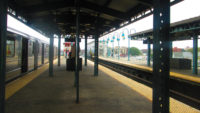Highways
Skanska Wins $267M California Freeway Interchange Contract

The scope of this final phase of the project includes the main freeway improvements for the interchange of California State Route 57 and 60 in the San Gabriel Valley.
Photo courtesy of City of Diamond Bar
A regional government planning agency in California selected Skanska for a $267-million contract for the third, final and largest phase of a highway interchange improvement project in the Los Angeles area.
The San Gabriel Valley Council of Governments’ State Route 57/60 confluence project covers a 2-mile section of highway in Diamond Bar and City of Industry, Calif. The scope of this phase includes the mainline freeway improvements with reconstruction of an overpass bridge, construction of an elevated bypass for eastbound SR-60, widening of one ramp and reconfiguration of other ramps.
The Los Angeles County Metropolitan Transportation Authority says the stretch is among the busiest truck freight routes and most congested freeway segments in the country. The project is designed to increase capacity, improve traffic flow and reduce congestion, according to Mike Aparicio, Skanska USA’s executive vice president of West Coast operations.
“Not only will this project alleviate congestion in the area, but it will reduce emissions and improve the lives of surrounding communities,” Aparicio said in a statement.
Skanska beat out four other bidders for the project: OHLA USA Inc., MCM Construction Inc., Griffith-Atkinson Joint Venture and Steve P. Rados Inc., San Gabriel governments (SGVCOG) records show. Proposals ran between Skanska’s low bid of $266.9 million and the highest bid of $341 million.
Bid Protest
The second-lowest bidder, OHLA, submitted a protest in January, records show. With less than $6 million between its bid and Skanska’s, OHLA raised issues with subcontractors included in Skanska’s bid. It alleged one stone column subcontractor did not meet the minimum qualifications set in the invitation for bids, and that a sub Skanska relied on for its diverse business enterprise goal was not certified for the driven pile and related work it was listed to perform.
In its response to the bid protest, Skanska provided evidence that both subcontractors did have the relevant experience and certification, and SGVCOG staff ultimately sided with Skanska and rejected the protest, records show. Neither company immediately responded to inquiries about the protest.
Skanska plans to start construction next month and to complete the project in June 2028.
Earlier phases of the project covered construction of additional ramps, an auxiliary lane and street widening in the area.
LA Metro served as the implementing agency for the design phase, which wrapped up last year. Earlier this year, LA Metro and SGVCOG set a funding agreement to cover the cost of the final construction contract.




